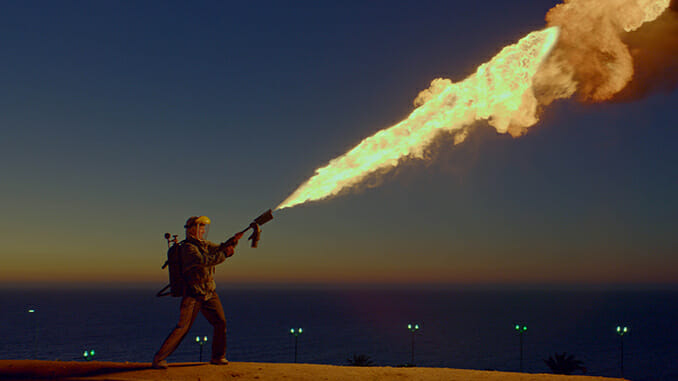No Country for Old Infertile Pigs in Pablo Larraín’s Invigorating, Upsetting Ema
Images via Layla Hancock Piper (CMPR)
Ema is inextricable from impulse. When we meet her (Mariana Di Girolamo) in Pablo Larraín’s latest film, she is kinetic—leading her husband Gaston’s (Gael Garcia Bernal) dance troupe, the loose center of a mass of bodies paroxysming to Nicolas Jaar’s teeming, steaming EDM, the big wall behind them a video of a broiling, looming star in close-up—and she rarely stops moving thereafter.
Likewise, Ema begins with catharsis: A traffic signal engulfed in flame, far past the point of its stoplights blinking legibly. Just a ball of fire dangling from government property. We learn that Ema’s days practicing her husband’s choreography in the Chilean port city of Valparaíso become nights in which she, festooned with a flamethrower left over from one of his botched performance pieces, sneaks into the streets to burn down the symbols of civilized order. She gets off on blasting pyroplasm into the twilight sky, and cinematographer Sergio Armstrong frames Girolamo, phallic fire erupting from her torso, as one would a prophet at the end of the world. Or a supervillain. Or a god inseminating the cosmos. Her work speaks for itself: There’s that traffic light popping, a swing set smoldering, a statue bust of some politician curdling, a car churning with the kind of anger only napalm can manifest—the industrial lights of the harbor shining always just at the coast, limning Ema’s acts of anarchy with a beatific horizon. Larraín’s images reach mythic proportions. Yeah, we get it. Burning it all to the ground is in our blood. Annihilation is our birthright and our destiny.
But fueling Gaston’s latest performance piece and Ema’s incendiary nights is the grief they share. They’re haunted by their choice to return their foster son, Polo (Cristián Suárez), to the State after he set Ema’s sister’s (Susana Hidalgo) face on fire, scarring her horribly. Some would insist it’s an accident, others wouldn’t—Gaston reminds Ema, as their relationship disintegrates, that she pushed all kinds of boundaries with Polo, undressing in front of the six-year-old and even putting her nipple in his mouth. Ema reminds Gaston that he is an “infertile pig,” a walking “condom,” that they wouldn’t have had to adopt in the first place if his sperm weren’t useless. If his body, so unlike hers, wasn’t failing. This is his fault.
He’s older than her by 12 years, a generational difference, and she no longer wants to dance the old-fashioned way he wants her to dance. Instead, she wants reggaeton—flanked by a small army of her young and lithe fellow dancers, she tells Gaston that reggaeton is the real music of the port, not his folksy avant garde stuff that’s still tied to the old Chile, to dictatorship and authoritarianism and control. Though her husband hardly represents The Man, he is a man, and so he won’t ever understand the liberation reggaeton provides Ema. The music gives her agency over her body, a powerful entity she only begins to wield as their marriage flounders. Gaston, perhaps because he still remembers the old Chile, argues that reggaeton is not the music of freedom, but the music of prisons. The beat of metal bars and unthinking compulsion betrays all deeper thought, keeps the oppressed classes deluded to the tools of their oppression. Larraín and Armstrong, in turn, film much of Valparaiso as a jailyard, the basketball courts and football pitches and cement city parks where Ema and her cohorts dance surrounded by the edifices of low-cost living and class stratification. Both Ema and Gaston are right, probably, but his body isn’t on the line like hers is.
-

-

-

-

-

-

-

-

-

-

-

-

-

-

-

-

-

-

-

-

-

-

-

-

-

-

-

-

-

-

-

-

-

-

-

-

-

-

-

-








































